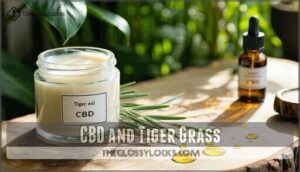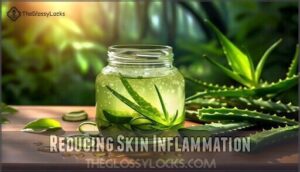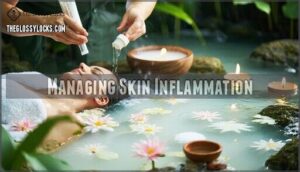This site is supported by our readers. We may earn a commission, at no cost to you, if you purchase through links.

Aloe vera delivers deep hydration to soothe irritated patches, while witch hazel controls excess oil that often accompanies inflammation.
Chamomile provides antimicrobial benefits that prevent secondary infections from scratching.
Sea buckthorn oil accelerates cellular regeneration for faster healing.
The trick isn’t buying everything—it’s choosing products to reduce skin inflammation that target your specific triggers, whether that’s UV damage, pollution exposure, or hormonal fluctuations.
Your inflamed skin responds best to gentle formulations that work with your natural healing processes, not against them.
Table Of Contents
- Key Takeaways
- Causes of Skin Inflammation
- Anti-Inflammatory Ingredients
- Reducing Skin Inflammation
- Effective Skincare Products
- Managing Skin Inflammation
- Frequently Asked Questions (FAQs)
- How to get rid of inflammation on skin fast?
- What’s the best anti-inflammatory for skin?
- What skincare products are good for inflammation?
- Can diet changes reduce skin inflammation naturally?
- How long before inflammation treatments show results?
- Which makeup products worsen inflammatory skin conditions?
- Are natural remedies safer than prescription treatments?
- Can exercise routines help minimize skin inflammation?
- Which products work best for specific skin types?
- Are there any side effects from anti-inflammatory skincare ingredients?
- Conclusion
Key Takeaways
- Target your triggers – You’ll get better results by identifying what’s causing your inflammation (UV damage, pollution, hormones) and choosing products with specific ingredients like niacinamide for barrier strength or aloe vera for hydration, rather than using generic solutions.
- Start simple and build consistency – You’ll see up to 20% better results with a minimalist routine (cleanser, moisturizer, SPF) used consistently, rather than overloading sensitive skin with multiple products that can trigger more irritation.
- Choose science-backed ingredients – You’ll find the most effective relief with proven anti-inflammatory compounds like niacinamide (reduces redness), aloe vera (soothes irritation), witch hazel (controls oil), and chamomile (provides antimicrobial benefits).
- Expect gradual improvement – You’ll typically see initial results within 2-4 weeks and significant improvement after 6-12 weeks of consistent use, so patience and persistence matter more than expensive quick fixes.
Causes of Skin Inflammation
Skin inflammation affects nearly everyone at some point, appearing as redness, swelling, breakouts, or persistent itching that disrupts your daily routine.
Understanding what triggers your skin’s inflammatory response is the first step toward finding effective products and treatments that actually work.
Environmental Factors
Environmental factors create the perfect storm for skin inflammation, turning your daily routine into a battlefield for your complexion.
Your skin faces a daily war zone of irritants and aggressors
Your skin can’t escape the daily assault of environmental aggressors targeting your complexion.
UV exposure breaks down collagen while triggering free radical damage, and pollution effects deposit irritating particles that penetrate your skin barrier.
Seasonal changes and climate impact affect humidity levels, causing dryness or excess oil production, making antiinflammatory skincare essential.
Poor air quality compounds these issues, making redness relief cream needs and protecting sensitive skin solutions from environmental assault.
Allergens and Irritants
Besides environmental factors, allergens and irritants lurk everywhere, from your favorite perfume to that "gentle" soap that leaves your skin screaming.
Your skin’s basically playing detective, trying to figure out what’s friend or foe.
Your skin’s in survival mode, constantly sorting allies from enemies in everything that touches it
Your skin’s constantly deciding whether to trust or panic when something new touches it.
Common culprits triggering skin inflammation:
- Fragrances – Hidden in everything from detergents to skincare products
- Metals – Nickel in jewelry, belt buckles, and phone cases
- Preservatives – Formaldehyde releasers in cosmetics and household items
- Plants – Poison ivy, oak, and even some "natural" skincare ingredients
Identifying allergens through patch testing helps pinpoint your triggers.
Contact dermatitis develops when irritants breach your skin barrier, causing redness and sensitivity.
Smart allergen avoidance becomes your superpower once you know what sets your skin off.
Infections and Hormonal Changes
Beyond the surface-level reactions, bacterial infections and hormonal changes create deeper skin inflammation that’s harder to control.
Bacterial infections disrupt your skin’s natural defenses, while stress hormones and hormonal acne trigger inflammatory cascades that can persist for weeks.
| Trigger Type | Common Causes | Inflammation Response | Treatment Focus | Timeline |
|---|---|---|---|---|
| Bacterial Infections | Staph, strep, acne bacteria | Redness, swelling, pus formation | Antimicrobial products, gentle cleansing | 1-2 weeks |
| Hormonal Acne | Menstrual cycles, PCOS, puberty | Deep cysts, persistent breakouts | Hormone-balancing ingredients | 3-6 months |
| Fungal Infections | Yeast overgrowth, humid conditions | Itchy patches, scaling | Antifungal treatments | 2-4 weeks |
| Stress Hormones | Cortisol spikes, chronic stress | Delayed healing, increased sensitivity | Calming skincare routine | Ongoing |
| Rosacea Triggers | Heat, spicy foods, emotions | Persistent redness, burning sensation | Anti-inflammatory products | Lifelong management |
Understanding these patterns helps you choose targeted skin inflammation products rather than generic solutions.
Lifestyle Choices and Genetics
Your dietary habits pack more punch than you might think regarding skin inflammation causes.
Processed foods high in sugar and refined carbs trigger inflammatory responses, while stress management and poor sleep quality disrupt your body’s natural healing processes.
Your genetic predisposition determines how sensitive you’ll be to these lifestyle changes, though regular exercise effects can help counteract inflammation regardless of your DNA’s starting point, and overall stress management plays a crucial role.
Anti-Inflammatory Ingredients
When your skin’s throwing a tantrum with redness and irritation, the right anti-inflammatory ingredients can be game-changers for restoring calm.
Science-backed compounds like niacinamide, aloe vera, and chamomile work at the cellular level to reduce inflammation while strengthening your skin’s natural defenses.
Niacinamide and Aloe Vera
Two powerhouse ingredients tackle skin inflammation from different angles. Niacinamide strengthens your barrier while reducing redness, and aloe vera delivers deep hydration with anti-inflammatory compounds that outperform hydrocortisone.
Many people find relief using niacinamide aloe products.
Key niacinamide benefits and aloe hydration advantages:
- Barrier strength: Niacinamide fortifies skin’s protective layer against irritants
- Redness reduction: Both ingredients calm inflamed tissue and minimize discoloration
- Product combinations: Layer niacinamide serums under aloe-based moisturizers safely
- Antiinflammatory skincare: Clinical studies confirm effectiveness for sensitive skin conditions
- Gentle relief: Aloe vera soothes without stinging, perfect for compromised skin barriers
Witch Hazel and Chamomile
Witch hazel uses include calming inflammation and eliminating excess oil, while chamomile benefits encompass soothing itchy skin with antimicrobial properties.
These extract combinations work synergistically in antiinflammatory skincare product formulations. Both witch hazel and chamomile are gentle skin soothing ingredients perfect for sensitive skin experiencing inflammation.
You can find a variety of specialized skincare options online.
| Ingredient | Primary Benefits | Active Compounds | Best For |
|---|---|---|---|
| Witch Hazel | Reduces inflammation, unclogs pores | Gallic acid, tannins | Oily, acne-prone skin |
| Chamomile | Soothes itching, antimicrobial action | Apigenin antioxidants | Sensitive, irritated skin |
| Combined Formula | Enhanced anti-inflammatory power | Synergistic compound blend | All inflamed skin types |
| Product Application | Targeted inflammation relief | Multiple active pathways | Daily skincare routine |
Sea Buckthorn and Calendula
Sea buckthorn oil and calendula represent nature’s powerhouse duo for cellular regeneration and wound healing.
These natural antiinflammatory ingredients strengthen skin defenses while protecting against sun damage through centuries of medicinal uses.
Five Key Benefits of Sea Buckthorn Oil and Calendula:
- Accelerates cellular regeneration – Sea buckthorn’s omega fatty acids and calendula’s flavonoids promote faster skin repair
- Enhances wound healing – Both ingredients increase fibroblast activity and collagen production for damaged skin
- Fortifies skin defenses – Antioxidants in both oils create protective barriers against environmental stressors
- Minimizes sun damage – Vitamins A, C, and E shield against UV-induced inflammation and premature aging
- Delivers proven medicinal benefits – Clinical studies show significant improvements in psoriasis and eczema symptoms
These skin soothing ingredients work synergistically to calm skin inflammation while rebuilding your skin’s natural protective barrier.
Sea buckthorn’s oil is often extracted using the cold-pressing method.
CBD and Tiger Grass
CBD interacts with your skin’s receptors to calm redness and itching while treating eczema and psoriasis.
You’ll want high-quality CBD from trusted brands to avoid toxin contamination.
Tiger grass (centella asiatica) rebuilds your skin’s moisture barrier and boosts collagen production.
These antiinflammatory ingredients work together for effective inflammation reduction, making them powerful additions to any redness relief cream targeting skin barrier repair.
Reducing Skin Inflammation
When you’re dealing with inflamed skin, the right approach can make all the difference between ongoing irritation and genuine relief.
Start with simple changes like switching to cool water for cleansing and consider installing mineral filters if hard water might be contributing to your skin’s distress.
Simple Skincare Routines
Several studies show minimalist skincare routines reduce inflammation by up to 20% compared to complex regimens.
Your gentle cleansing approach should focus on hydration and product prioritization—think cleanser, moisturizer, SPF.
This routine consistency prevents overloading sensitive skin with potential irritants.
A simplified routine can help balance natural oils, enhancing hydration.
When you’re battling redness, less truly becomes more for lasting results.
Using Mineral Filters
Mineral sunscreens protect your skin like a shield, creating a physical barrier that reflects UV rays without penetrating deeper layers.
These gentle filters offer immediate broad-spectrum protection while their anti-inflammatory properties actively calm irritated skin. High-quality sunscreens can be easily purchased online.
- Filter effectiveness depends on zinc oxide and titanium dioxide concentrations
- Mineral composition remains stable under sun exposure, preventing degradation
- Installation process involves applying evenly before sun exposure for maximum coverage
- Maintenance schedule requires reapplication every two hours for continued protection
Cool Water Cleansing
When cleansing inflamed skin, water temperature plays a vital role in irritation reduction and ideal hydration.
Hot water strips your skin’s natural oils, worsening redness and skin inflammation, while cool water provides soothing, calming benefits.
Cool temperatures minimize skin sensitivity and support your skin’s barrier function, making it the ideal choice for reducing skin irritation during your daily cleansing routine, which is crucial for ideal hydration.
Effective Skincare Products
When dealing with skin inflammation, the right product ingredients can make all the difference between healing and continued irritation. A gentle, alcohol-free toner containing 98% natural distilled witch hazel, hyaluronic acid, and vitamin E offers thorough anti-inflammatory benefits without harsh chemicals.
Application techniques matter just as much as ingredients—use cool water and gentle patting motions to avoid triggering additional redness. For sensitive skin, start with minimal product combinations to identify what works best for your unique needs.
This particular toner removes impurities while moisturizing, making it suitable for daily use on reactive skin types. The calming face serum properties help with skin barrier repair through consistent use.
Long-term effects include reduced pore size, controlled oil production, and improved skin texture. Dermatologist-recommended formulas free from parabens, dyes, and sulfates provide the safest approach to redness reduction products, ensuring your skin gets the gentle care it deserves.
Managing Skin Inflammation
Managing inflammation requires a strategic approach that balances immediate relief with long-term skin health.
You’ll achieve the best results by combining professional guidance with consistent daily habits that protect and repair your skin barrier, which is crucial for maintaining healthy skin through long-term skin health.
When to Seek Professional Help
While high-quality skincare products can address many inflammatory skin diseases, knowing when professional intervention becomes necessary protects your skin’s long-term health.
Your dermatologist can provide accurate medical diagnosis when home treatments aren’t delivering skin inflammation reduction results.
- Severe symptoms persist beyond two weeks despite consistent treatment
- Emergency care needed for widespread skin lesions, fever, or intense pain
- Chronic conditions require dermatology expertise for proper management
- Dermatologist referral essential when over-the-counter solutions fail repeatedly
Dermatologist Recommendations
Dermatologists consistently recommend specific antiinflammatory ingredients backed by clinical research for sensitive skin.
Their expert endorsements focus on proven ingredient efficacy and treatment plans customized to individual needs.
| Dermatologist-Trusted Ingredients | Primary Benefits |
|---|---|
| Niacinamide | Reduces redness, strengthens barrier |
| Aloe Vera | Soothes inflammation, hydrates deeply |
| Chamomile | Calms irritation, antimicrobial action |
Professional product selection emphasizes skincare products with documented anti-inflammatory properties, ensuring you’re investing in treatments that actually work for your skin’s specific concerns.
Combining Lifestyle Habits and Skincare
Your skin’s healing journey requires more than topical treatments alone.
Combining lifestyle habits with targeted skincare creates a powerful defense against skin inflammation, addressing root causes while supporting your skin barrier’s natural recovery.
- Diet and Skin: Reduce processed foods and sugar to minimize systemic inflammation
- Stress Management: Practice meditation or yoga to lower cortisol-driven breakouts
- Sleep Quality: Aim for 7-9 hours to allow cellular repair and barrier restoration
- Hydration Importance: Drink adequate water to maintain skin moisture from within
Protecting Against Free Radicals and Pollution
Battling environmental stressors requires robust antioxidant defense to neutralize free radical damage from pollution exposure.
You’ll need skincare products containing vitamin C, green tea, and resveratrol to strengthen barrier protection against daily pollutants.
These antioxidants work like shields, preventing free radicals from triggering skin inflammation and accelerating aging processes.
Consistent use of broad-spectrum sunscreen is also essential for protection.
Frequently Asked Questions (FAQs)
How to get rid of inflammation on skin fast?
While you’re expecting a quick fix, skin inflammation actually requires patience—but these steps help fast.
Use cool compresses, apply aloe vera gel, take anti-inflammatory supplements, avoid irritants, and use gentle, fragrance-free moisturizers with niacinamide daily.
What’s the best anti-inflammatory for skin?
Niacinamide stands out as the top anti-inflammatory for skin, reducing redness while strengthening your barrier. Aloe vera and chamomile offer gentle alternatives that soothe irritation effectively without harsh side effects.
What skincare products are good for inflammation?
Struggling with angry, red skin that won’t calm down?
You’ll want products with niacinamide, aloe vera, ceramides, and azelaic acid – these proven ingredients strengthen your skin barrier while reducing inflammation effectively.
Can diet changes reduce skin inflammation naturally?
Yes, dietary changes can substantially reduce skin inflammation naturally.
Avoiding processed foods high in sugar and refined carbs helps calm irritated skin from within.
Increasing omega-3 rich foods, antioxidants, and anti-inflammatory ingredients also plays a crucial role in this process, as it helps to calm irritated skin from within.
How long before inflammation treatments show results?
Rome wasn’t built in a day, and neither is healthy skin.
Most anti-inflammatory treatments show initial improvements within 2-4 weeks, with significant results typically appearing after 6-12 weeks of consistent use.
Which makeup products worsen inflammatory skin conditions?
Heavy foundations, waterproof mascaras, and fragranced products can trigger flare-ups. Look for comedogenic ingredients like silicones and harsh preservatives. You’ll want non-comedogenic, fragrance-free formulas instead.
Are natural remedies safer than prescription treatments?
Natural remedies aren’t automatically safer than prescriptions.
Both can cause reactions or interactions.
Prescription treatments undergo rigorous testing, while natural ingredients vary in quality and potency.
Consult your dermatologist for personalized advice.
Can exercise routines help minimize skin inflammation?
Like a gentle breeze cooling heated skin, regular exercise can reduce inflammation by improving circulation and lowering stress hormones.
You’ll benefit from activities that promote blood flow without excessive sweating, which can irritate sensitive skin, and find that regular exercise can be particularly helpful in this regard, by also lowering stress hormones.
Which products work best for specific skin types?
For oily skin, you’ll want niacinamide and azelaic acid to control sebum and reduce inflammation.
Dry skin responds well to hyaluronic acid, ceramides, and aloe vera for hydration.
Sensitive skin benefits from chamomile and centella asiatica.
Are there any side effects from anti-inflammatory skincare ingredients?
Even the gentlest rain can cause a flood – anti-inflammatory skincare ingredients can trigger allergic reactions, irritation, or sensitivity.
You’ll want to patch-test new products and watch for redness, burning, or breakouts before applying them broadly, considering the potential for allergic reactions.
Conclusion
Imagine this: your angry, red skin finally finding peace after months of frustration.
The right products to reduce skin inflammation aren’t luxury items—they’re necessities that restore your skin’s natural balance.
By targeting your specific triggers with evidence-based ingredients like niacinamide, aloe vera, and chamomile, you’ll build a routine that works with your skin, not against it.
Remember, consistency beats complexity every time, and your skin will thank you for choosing gentle, targeted solutions over harsh quick fixes.
- https://www.reddit.com/r/SkincareAddiction/comments/1are3d2/routine_help_what_is_the_most_powerful/
- https://dermnetnz.org/topics/non-steroidal-anti-inflammatory-drugs-and-their-skin-side-effects
- https://pmc.ncbi.nlm.nih.gov/articles/PMC3834722/
- https://www.sitimedspa.com/blog/12-best-anti-inflammatory-skincare-ingredients
- https://magnolialeague.com/blogs/magnolia-league-journal/best-anti-inflammatory-skincare-ingredients-for-clear-calm-skin









